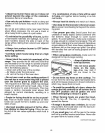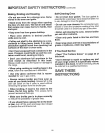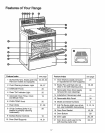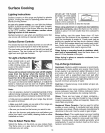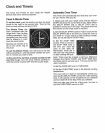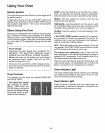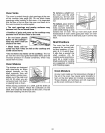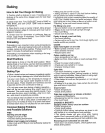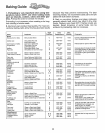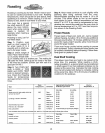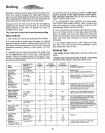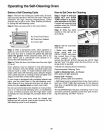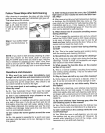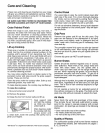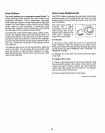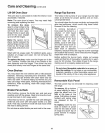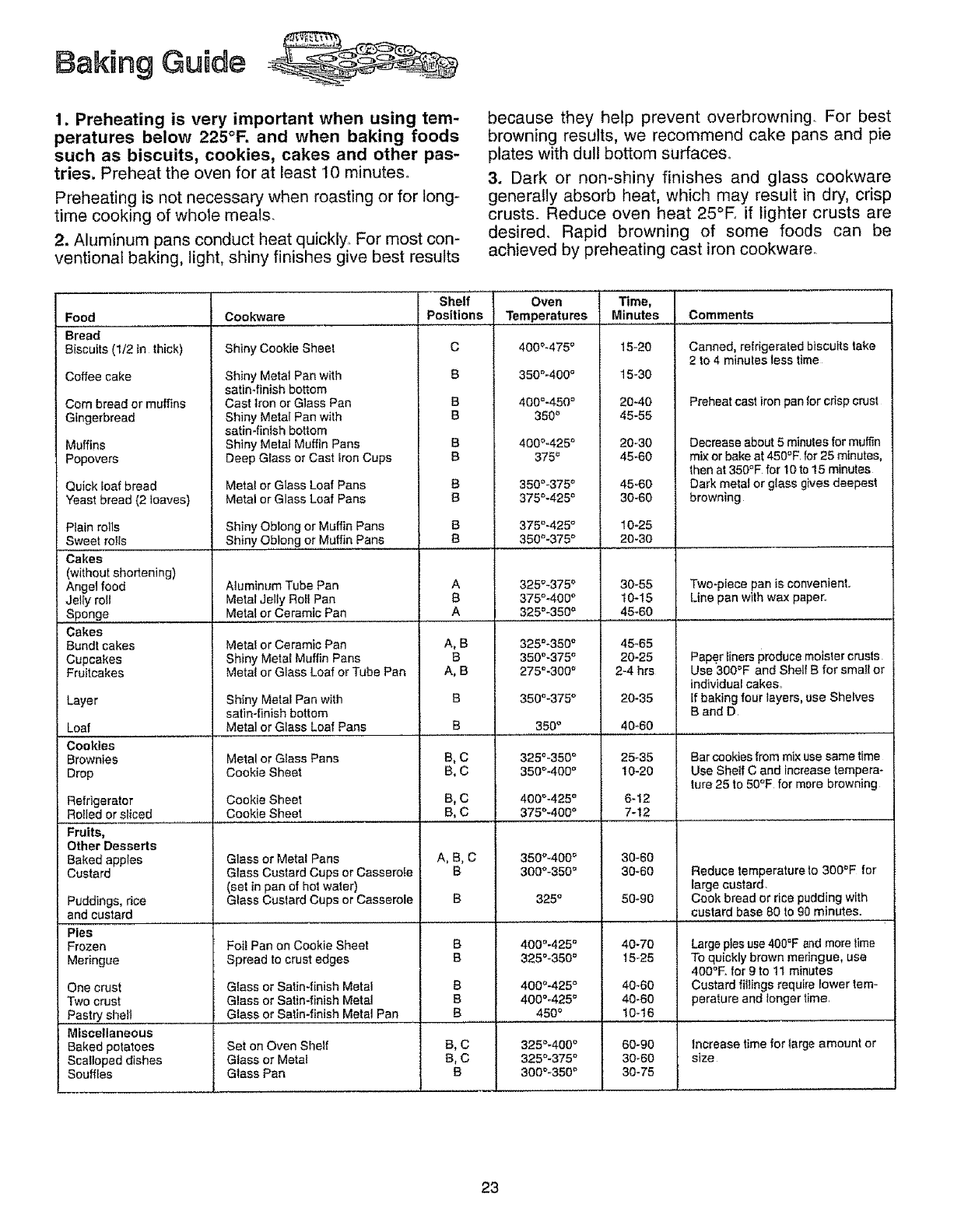
Baking Guide
1. Preheating is very important when using tem-
peratures below 225°F. and when baking foods
such as biscuits, cookies, cakes and other pas-
tries. Preheat the oven for at least 10 minutes,.
Preheating is not necessary when roasting or for long-
time cooking of whole meals.
2. Aluminum pans conduct heat quickly., For most con-
ventional baking, light, shiny finishes give best results
because they help prevent overbrowning. For best
browning results, we recommend cake pans and pie
plates with dull bottom surfaces..
3. Dark or non-shiny finishes and glass cookware
generally absorb heat, which may result in dry, crisp
crusts. Reduce oven heat 25°E if lighter crusts are
desired. Rapid browning of some foods can be
achieved by preheating cast iron cookware.
:ood
Bread
Biscuits (1/2 in thick)
Coffee cake
Corn bread or muffins
Gingerbread
Muffins
Popovers
Quickloafb_ad
Yeast b_ad (2 loaves)
Plain rolls
Sweet rolls
Cakes
(without shortening)
Anget food
Jelly roll
Sponge
Cakes
Bundt cakes
Cupcakes
Fruitcakes
Layer
Loaf
Cookies
Brownies
Drop
Refrigerator
Rolled or sliced
Fruits,
Other Desserts
Baked apples
Custard
Puddings, rice
and custard
Pies
Frozen
Meringue
ONe Crust
TWOcrust
Pastry shell
Miscellaneous
Baked potatoes
Scalloped dishes
Souffles
Cookware
Shiny Cookie Sheet
Shiny Metal Pan with
sat!refinish bottom
Cast Iron or Glass Pan
Shiny Metal Pan with
satin-finish bottom
Shiny Metal Muffin Pans
Deep Glass or Cast Iron Cups
Metal or Glass Loaf Pans
Metal or Glass Loaf Pans
Shiny Oblong or Muffin Pans
Shiny Oblong or Muffin Pans
Aluminum Tube Pan
Metal Jelly Rolt Pan
Metal or Ceramic Pan
Metal or Ceramic Pan
Shiny Metal Muffin Pans
Metal or Glass Loaf or Tube Pan
Shiny Metal Pan with
satimfinish bottom
Metal or Glass Loaf Pans
Metal or Glass Pans
Cookie Sheet
Cookie Sheet
Cookie Sheet
Glass or Metal Pans
Glass Custard Cups or Casserole
(set in pan of hot water)
Glass Cuslard Cups or Casserole
Foi! Pan on Cookie Sheet
Spread to crust edges
Gfass or Satin-finish Metal
Glass or Satin-finish Metal
Glass or Satin4inish Metal Pan
Set on Oven Shelf
Glass or Metal
Glass Pan
Shelf
Positions
c
S
A
B
A
A,B
S
A, B
B,C
B,C
B, C
B, C
A,B,C
B
B
B
B
S,C
B, C
B
Oven
Temperatures
400o_475°
350°-400 °
400=-450 °
350°
400_-425 _
375_
350°-375 o
375°-425 °
375_-425 =
350_-375 °
325°-375 _
3750-400 °
325=-350 _
325°-350 °
350°.375 °
275_-300 _
350°-375 °
350°
325°-350 °
350o.400"
400o.425 o
375o-400 _
350_.400 °
300o-350 _
325°
400°-425 °
325°-350 °
400"-425 °
400o-425 o
450°
3250-400 °
325°-375 °
300°-350 °
Time,
Minutes
15-20
15-30
20-40
45-55
20-30
45-60
45-60
30-60
10-25
20-30
30-55
10-15
45-60
45-65
20-25
2-4 hrs
2O-35
40-60
25-35
10-20
6-12
7-12
30-60
30-60
50-90
40-70
15-25
40-60
40-60
10-16
6_90
30_60
30-75
Comments
Canned, refrigerated biscuits take
2 to 4 minules less time
Preheat cast iron pan for crisp crust
Decrease about5 minules for muffin
mix or bake at 450_F. for 25 minutes,
then at 350°F for 10 to 15 minutes
Dark metal or glass gives deepest
browning
Two-piece pan is convenient.
Line pan with wax paper.
Paper Finersproduce moister crusts
Use 300=F and Shelf B for small or
individual cakes.
If baking four layers, use Shelves
B and D.
Bar cookies from mix use same time
Use Shelf C and increase tempera-
ture 25 to 50°F for mere browning
Reduce temperature to 300_'F for
large custard
Cook bread or rice pudding with
custard base 80 to 90 minutes.
Large pies use 400°F and more time
To quickly brown meringue, use
400°E for 9 to 11 minutes
Custard fillings require lower tem-
perature and longer time.
Increase time for farge amount or
size
23



